How Early Can You Teach Sign Language to a Baby
It can be difficult to enhance a bilingual child, but the benefits of learning a 2d language at an early age are certainly worth the struggle.
Bilingual children larn faster and easier, have improved problem solving skills and creativity, and have more career opportunities in machismo. They besides discover it easier to connect with other cultures which makes them more open-minded and tolerant of diversity, and they are less likely to experience age-related mental affliction as they accomplish old age. Well-nigh importantly, it'south much easier to learn a second language at an early age.
In addition, learning a second language isn't every bit difficult as it used to be. Scientists are constantly studying second linguistic communication acquisition and developing new methodologies to aid kids learn faster. And, the rising need of language programs has created a whole new market of international summertime camps with language classes where kids can relish their favorite activities and learn a new linguistic communication at the same fourth dimension. Cheque out these international camps:
- Summer camps in the United states
- Summertime camps in Spain
- Summer camps in the Great britain
- Summertime camps in French republic
If y'all are looking for a Spanish linguistic communication program but don't accept the choice to travel away we can highly recommend the online live Spanish courses offered by Salamanca Academy or online Spanish courses offered by Malaga University. Another alternative for younger children is the language programs offered past foreignlanguagesforkids.com
The benefits of learning a second language at an early age
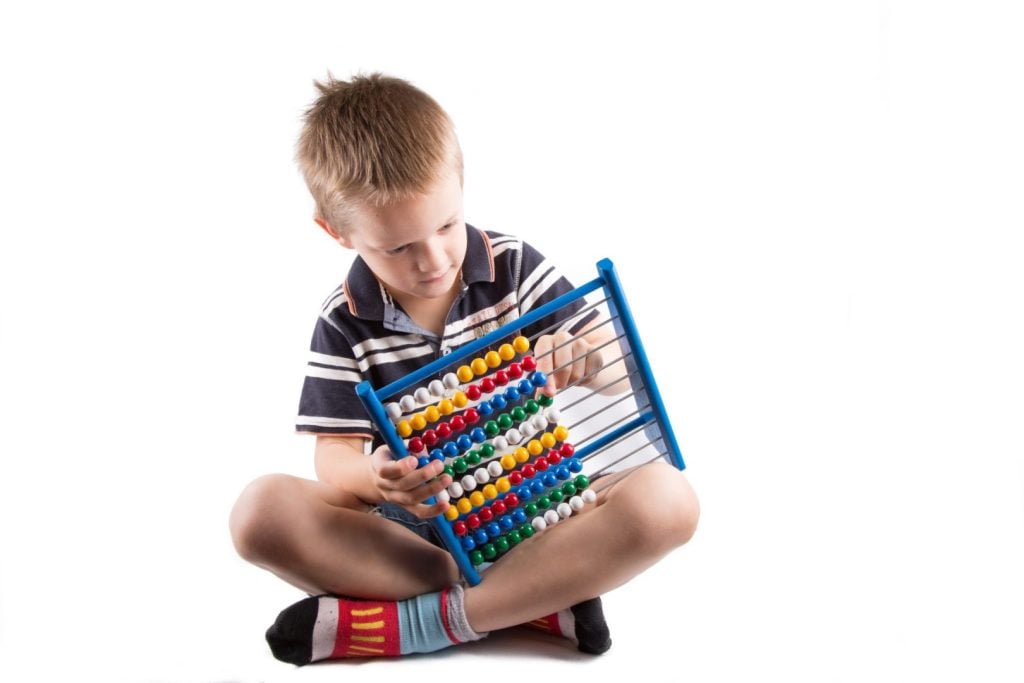
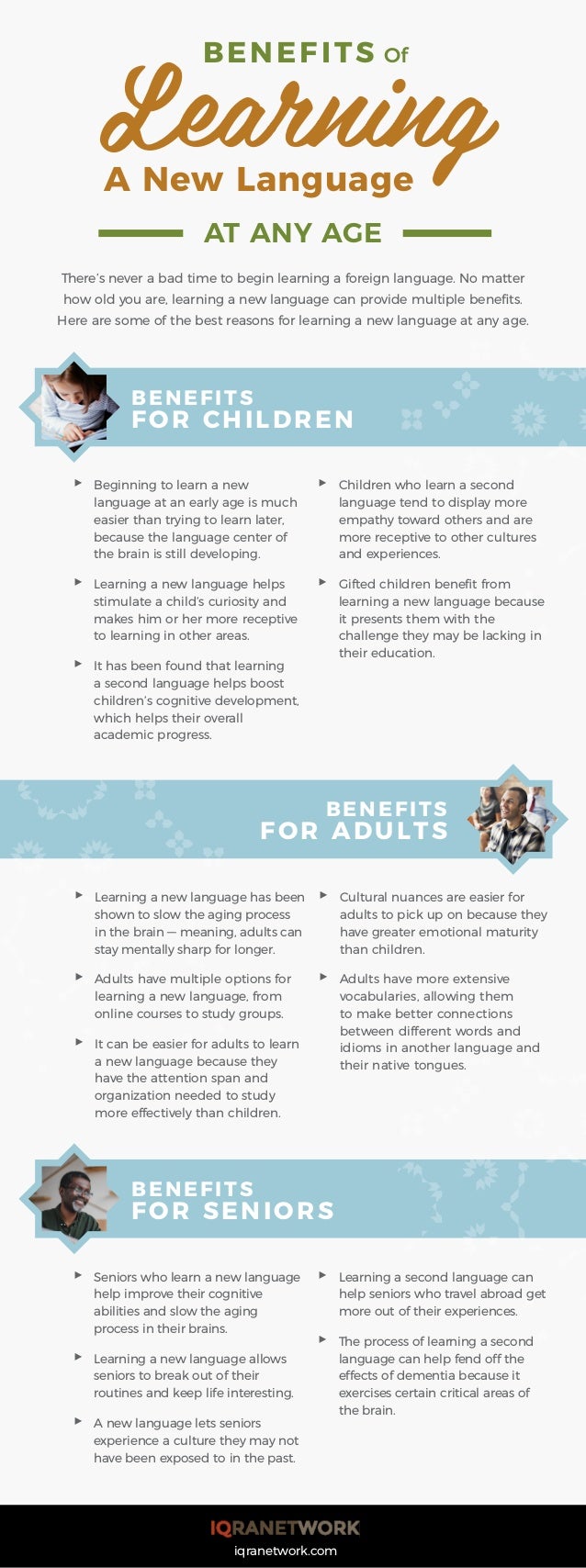
Benefits of learning a new language at any age. Created by IQRA Network
Learning a 2d linguistic communication is easier as a child
One of the main benefits of learning a 2nd linguistic communication at an early age is that children learn languages faster and easier. They have more time to learn, less to acquire, fewer inhibitions, and a encephalon designed for language learning. In brusque, teaching your child a 2nd language at an early historic period saves them from having to larn a 2d linguistic communication as an adult.
i. Brain structure facilitates second linguistic communication-learning
On a biological level, children are similar sponges. The brain of a child is designed to absorb new data unconsciously. They do this similarly to the way that we, as adults, unconsciously learn vocal lyrics, rhythms, and melodies. Dr. Paul Thompson, a neurology professor at UCLA, and his team found that the brain systems specialized in learning new languages grow chop-chop from around six years old until puberty. So these systems basically shut down and terminate growing from ages eleven to xv, during puberty. Click HERE to read more than about the study.

2. Baby brains accept special skills for 2nd language-learning
Take a look at this TED Talk where Patricia Kuhl explains how babies listen to the sounds around them and "take statistics" on the sounds they need to know. Earlier the age of 10 – 12, babies can differentiate between all sounds beyond all languages. Then, according to their exposure to languages, they start to only differentiate betwixt the language sounds which are necessary to create meaning. The Japanese language does not diferentiate between the 50 and ther sounds. Japanese babies before 10 months old, can hear the divergence between these sounds. Then, between 10 and 12 months former, they lose their capacity to differentiate.
Can babies learn a new language with radio and television receiver? Or exercise they need existent man interaction to absorb a new language? Skip to infinitesimal 7:05 to detect out.
iii. Children have less to learn than adults
Some other ane of the benefits of learning a 2nd language at an early age is that children think more merely than adults. They utilise fewer words, simpler sentence structures, and think less abstractly. Children who are learning a second linguistic communication are not overwhelmed past the task of communicating their abstract thoughts and feelings in their second language considering they simply don't have whatever. Then, as these children develop into adults, they learn to limited themselves in both their native and second languages. Adults, on the other manus, must face the daunting task of translating complex sentence structures and abstract thoughts to exist able to fully express themselves in their 2nd languages.
Combine Linguistic communication STUDY + SPORTS
Check out these tennis camps complete with Spanish classes!
Read More than
four. Children accept fourth dimension on their side
Think about the books you read as a kid compared to the books you read at present. Remember it took years of schooling and required reading to be able to empathize the texts y'all can read now. The aforementioned applies to writing, listening, and even speaking. It took at least 15 years of academic report to be able to communicate the way y'all do in your native linguistic communication. Time is another one of the benefits of learning a 2nd language at an early age. Children have time on their side. They can beginning small and simply and work their way up to both college levels of idea and advice at the same time. Children have a swell advantage over adults equally 2d language learners.
Learning a second language prepares children to exist adept trouble solvers
Children who learn a second linguistic communication abound up to be expert trouble-solvers and creative thinkers. Their brains feel a constant workout from a young age as they try to sort out which linguistic communication to speak and when. Researchers have establish that in addition to enhanced problem-solving skills, bilingual children are amend at planning, conentrating, and multi-tasking. And, they score college on standardized tests. Past teaching your kid a second language at a young age, you are setting them up for success.
5. Learning a second language means a constant mental workout
Bilinguals are constantly experiencing a mental workout as they sort through more than than one language organisation to communicate. In the 20thursday century, researchers and educators discouraged second linguistic communication learning. A second language was thought to interfere with children's intellectual and cognitive development. While at that place is evidence that bilingual children do experience this interference of linguistic communication systems, it turns out that the internal conflict that bilingual children experience prepares them to be expert problem solvers. Click here to read the full article.
6. Learning a 2d language means improved executive function
Collective prove from diverse studies demonstrates that learning a 2d language improves the encephalon'due south executive function. This ways, bilingual children are meliorate at:
- Planning
- Trouble solving
- Concentration
- Multitasking
An interesting study
In 2004, psychologists Ellen Bialystok and Michelle Martin-Rhee tested the trouble-solving abilities of bilingual and monolingual preschoolers. All children were asked to sort blue circles and red squares on a computer screen in two digital bins – i marked with a blue square and the other with a ruddy circle.

Commencement, they were asked to sort the shapes by color putting the blue shapes in the blueish bin and the cerise shapes in the red bin. Both children performed well.
Then, the preschoolers were asked to sort by shape placing the blue circles in the red circle bin and the scarlet squares in the blue circle bin. This job required more concentration every bit the children had to identify the shapes in a bin with a conflicting colour. Bilingual children performed this task quicker.
7. Learning a second linguistic communication leads to improved test scores
Another one of the many benefits of learning a second language at an early on age is improved exam scores. Students who study foreign languages perform better on standardized tests such as the American College Exam (Deed) and the Saturday exact sections. In fact, students test scores meliorate with the length of time they take spent learning a second language.
Combine Linguistic communication Report + SPORTS
Cheque out these soccer camps complete with Castilian classes!
Read More
An interesting written report

To read more inquiry regarding the effect of learning a second language on bookish performance, click HERE.
8. Learning a second linguistic communication fosters creative thinking
A heave in creatively is another one of thebenefits of learning a second language at an early age. Various studies have proven it.

One of the well-nigh used creativity tests is called the Torrance Tests of Creative Thinking (TTCT) created by Ellis Paul Torrance in 1962. These tests are designed to measure "divergent thinking" or thinking outside the norm, thinking creatively. Theymeasure participants' divergent thinking in iv areas: fluency, flexibility, originality, and elaboration.
Bilingual children score higher on the TTCT.
Take a look at some examples of TTCT test problems in the effigy below:
9. Learning a second language develops divergent thinking
Bilingual children learn to run into the world through different lenses. Therefore, they have dissimilar points of view at their disposal to be able to think creatively. Let me explain what I mean by "dissimilar lenses." Every new language we learn presents usa with new obstacles in terms of conveying significant. For instance, Turkish and Russian have no equivalents for the English language verbs "to have" or "to exist" – 2 of the most mutual English language verbs. Every bit bilingual minds work out means to bypass these barriers, they engage in intensive divergent thinking – the same divergent thinking that stimulates creativity.
Combine Linguistic communication Written report + SPORTS
Cheque out these golf camps complete with Spanish classes!
Read More
Interesting fact
As engineering advances in today's earth, machines are mastering more and more than intricate tasks such as translating texts or diagnosing illnesses. According to The Economist, 47% of jobs in America are vulnerable to automation. In poorer countries such as India and Ethopia, those numbers are even higher.
Tin you guess why more than jobs in poorer countries are vulnerable to automation?
Rich countries accept more jobs that are hard for machines to perform. The jobs that require original ideas (like advertising) or complex social interactions (similar arguing a case in court) volition be left to humans.
In times similar these, Inventiveness is more important than ever.

Learning a 2nd language prepares children for the workforce
10. Learning a 2nd language leads to more job opportunities
In the modern age of globalization, more and more companies are seeking employees that speak more than than one language. Furthermore, employees who speak more than than one linguistic communication are oft paid significantly more than their monolingual counterparts.
This claim applies to jobs beyond translation and interpretation. Companies need employees who tin communicate across borders and internationalize their specific products or services. This means that companies are often looking for employees that are able to translate into one or more than languages and specialize in a specific field. Bilingual individuals with feel or expertise in legal, medical, technical, or scientific fields can notice high paying jobs translating or interpreting.
This is keen news for bilingual children who either grow up in a bilingual household or accept significant exposure to two or more languages at a young age. Since children learn languages much faster than adults, they tin can larn a second language while they're immature and then spend their time at academy specializing in a specific field that they find interesting. Then, these bilingual specialists can accuse a lot of money to translate texts related to their expertise.
Whether these children grow up to go translators or interpreters in a specific field or observe a chore in the field while marketing themselves as bilingual, their salaries will be much greater than the salaries of their monolingual coworkers.
Learning a second language means connecting with more cultures
11. Bilingual children experience more opportunities for travel as they mature
One of the about exciting benefits of learning a second language at an early on age is being able to communicate with more people from different cultures. Children who learn a second language will have incredible opportunities to travel around the world and get to know other cultures.
English has get the world's lingua franca which ways English is the mutual language that people apply to communicate when they don't share a native language. These days, many immature people all effectually the world have a pretty skilful understanding of English language. That being said, children who speak English natively are extremely lucky. Equally they grow and mature, they'll be able to travel to many places and communicate with many people from all around the earth edifice tolerance and appreciation for cultural differences.
The image below presents the peak 10 countries with the highest proficiency of English language as a second language.
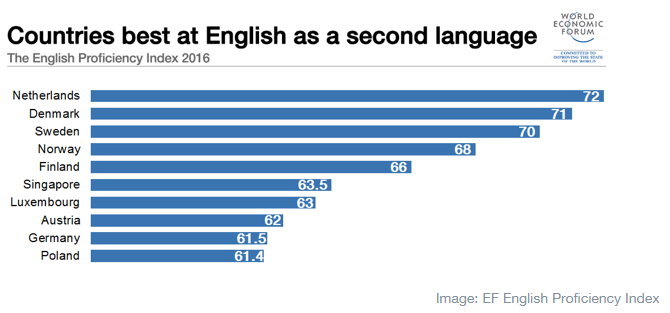
Nevertheless, many cute countries rich in culture and tradition are a scrap behind on the proficiency index. And, even the nearly proficient countries might only be proficient in bigger metropolitan cities where tourism drives the economic system. It'due south much easier to explore quaint little towns, to participate in authentic cultural rituals and ceremonies, and to really connect with people from other cultures when you speak their language.
Check out the images beneath to encounter the English language language proficiency of countries all around the world.
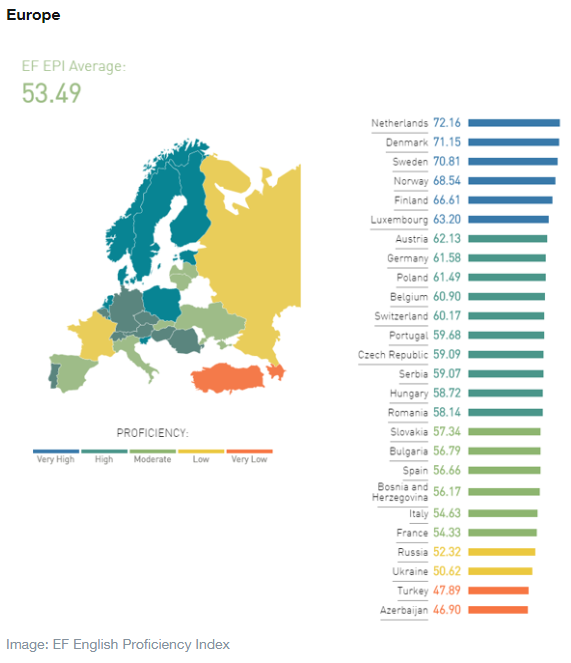
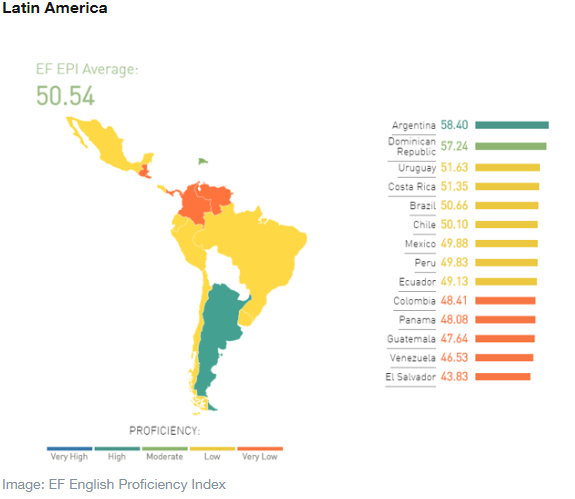
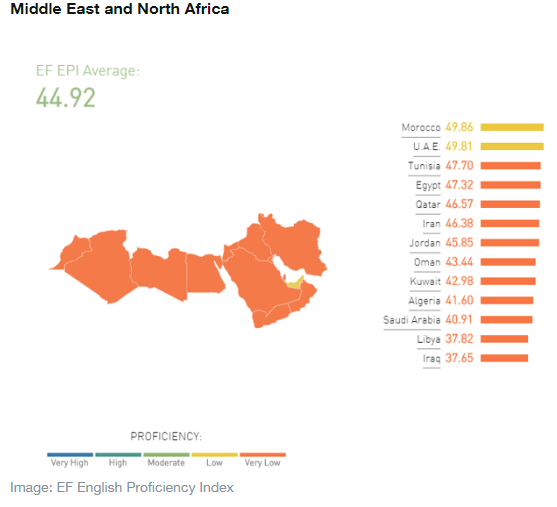

Luckily, native English speakers can choose their 2nd language
Native English speakers likewise take a second reward. While speakers of other languages are basically required to learn English as at that place 2d language, native English speakers have more freedom to cull which linguistic communication to study as their second language.
For children, what language they learn is actually up to their parents. Parents whose native language is not English oft teach their children their own native language. Past doing so, it'south easier to be involved in the child'due south learning procedure; these parents don't need to hire native speakers to come speak to their children, for example. Furthermore, their children can more easily connect to their own heritage.
But for young children who come up from monolingual English language speaking families, parents often must decide what language they would similar their child to learn from a long list of possibilities. Will they learn Spanish? Mandarin? Portuguese? Arabic? Some languages are more pop around the world than others and are therefore more useful.
The image below illustrates the near popular languages in each continent effectually the world.
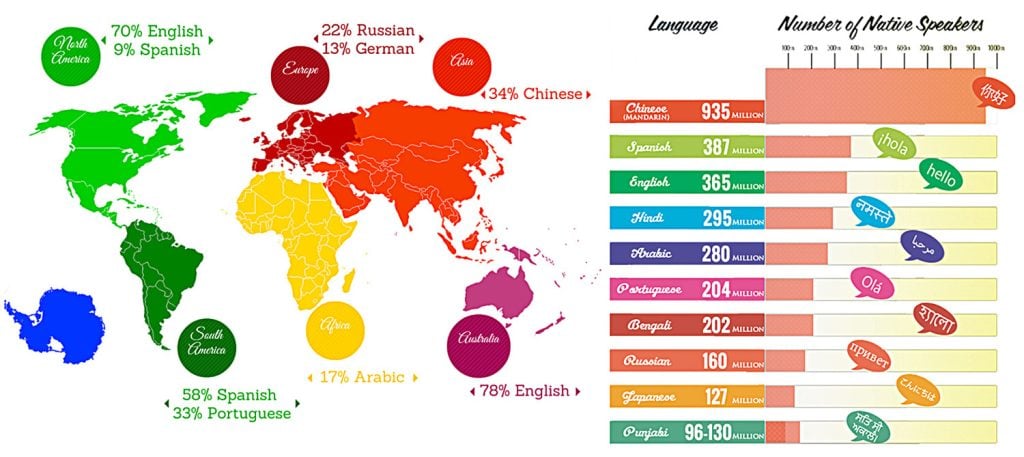
12. Learning a 2nd language prevents future historic period-related illnesses
Many studies have hypothesized that people who speak a second language regularly may be able to filibuster Alzheimer'southward disease by 4.5 years.
New enquiry published in the journalNeuropsychologia reveals that bilingualism makes changes in brain structure that are linked with resilience against Alzheimer'south illness and mild cognitive damage.
Researchers reason that this is due to the constant workout that a bilingual brain experiences as they constantly filter through data in 2 languages.
Click here to read to total article.
What take we learned? - 12 cardinal points
There are v main benefits of learning a second language at an early age.
- Learn faster and easier
- Amend problem solving and creativity
- Enhance futurity career opportunities
- Connect with other cultures and build tolerance
- Prevent age-related mental illness
This is why:
- Our brains are designed to acquire languages earlier we achieve puberty. Information technology's a good idea to offset learning every bit early as possible.
- Babies tin can differentiate all the sounds of language before 10 -12 months then they start to lose this chapters according to the sounds they find useful (their own linguistic communication). Therefore, it'southward good to expose babies to many different languages so they retain this power.
- Children think more just and therefore have less to learn. They don't become overwhelmed while attempting to communicate complex thoughts similar adults do.
- Children take much more time to dedicate to language learning. Learning is their full-time job.
- Bilingual brains experience a non-stop, total mental workout.
- This encephalon do leads to improved planning, trouble-solving, concentrating, and multitasking.
- This brain exercise also contributes to divergent thinking – out of the box thinking and problem-solving skills.
- Bilingual children are more creative.
- Learning a second language leads to improved test scores during childhood and adolescence.
- Every bit children get older, their bilingualism can help them get jobs and earn college wages.
- They'll besides have more opportunities to travel, connect to their heritage or go to know other cultures.
- Finally, equally they approach former age, their bilingualism will have the chapters to slow the onset of Alzheimer'south illness by 4.5 years.
About Ertheo
Ertheo is asports and education agency dedicated toempowering young athletes to reach their full potential asathletes andupstanding citizens.
As part of our mission, nosotros offer merely the best sports-education programs in the world.
Our squad is available to respond all of your questions and offer expert communication.
Call usa at(+44) 203 769 94 43 or(+34) 902 750 359.
wattssishomistend.blogspot.com
Source: https://www.ertheo.com/blog/en/learning-a-second-language/
0 Response to "How Early Can You Teach Sign Language to a Baby"
Post a Comment